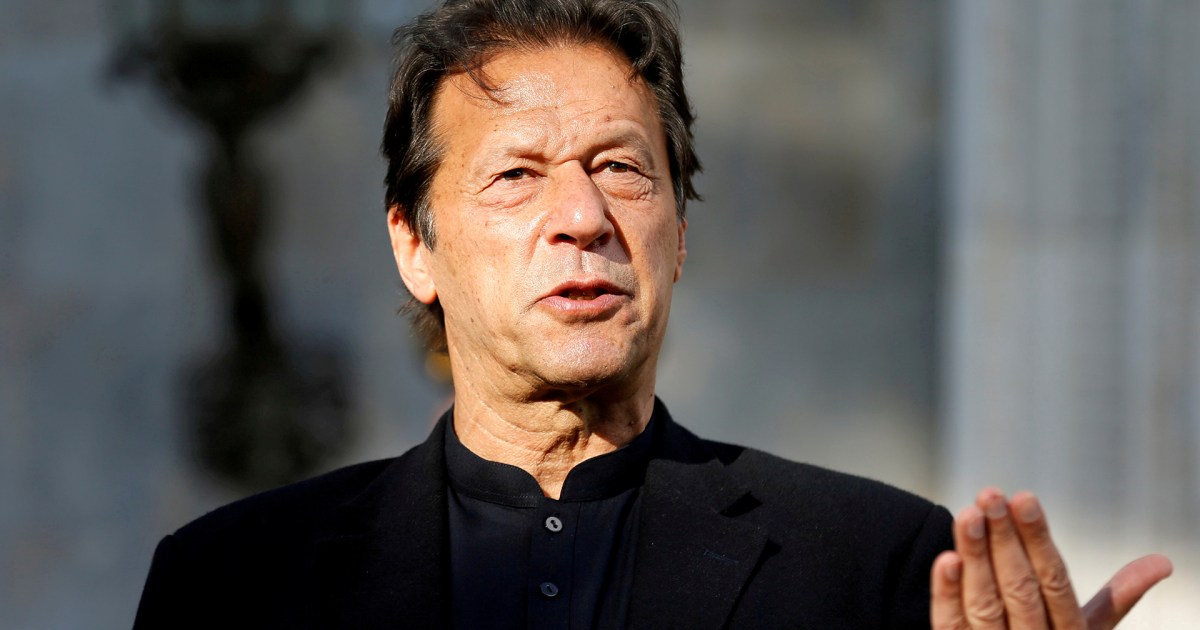Pakistani Prime Minister Imran Khan has begun reaching out to his electoral base, while Pakistanis await the Supreme Court's decision on the validity of measures that blocked a vote of no confidence in the government and led to the dissolution of Parliament.
Khan told workers from his party in Lahore - late on Tuesday - that he would be more careful in choosing candidates for his party, the "Insaf Movement", after a number of party deputies defected and allied with the opposition to discredit him, in the context of what Khan says is a foreign attempt. to overthrow him.
Khan - the former cricket star - lost his parliamentary majority, and almost faced a vote of no-confidence submitted by the opposition last Sunday, and he would have almost certainly lost, had it not been for the deputy speaker of Parliament who refused to hold the vote on the grounds that he violated the provisions of the constitution, because it was caused by "foreign interference".
Khan, 69, accuses the United States of seeking to overthrow him by plotting with the opposition, because he refuses to support Washington in the face of Russia and China.
The prime minister asked the head of state, Arif Alvi, who supports him, to dissolve parliament, and the latter responded to the request, which calls for early legislative elections within 90 days.
The opposition condemned these measures and challenged the decision of the parliament's presidency before the Supreme Court, which began examining the case last Monday.
Supreme Court sessions
Pakistanis are awaiting the Supreme Court's decision, which may be issued tomorrow, Thursday, after the court today heard the arguments of lawyers from the PTI.
Court President Omar Atta Bandial said today that he wants to end the hearings, and continued, "Let's start early tomorrow to finish the case."
During today's session, President Arif Alvi's lawyer, Ali Zafar, said the court should not interfere in parliamentary proceedings.
He added before the court - composed of 5 judges - "My humble estimation is that if you start monitoring parliamentary affairs, there will be no end to that."
The court can order the reconstitution of parliament, call for new elections, or prevent Khan from taking power if it determines that he has violated the constitution, and it can also decide that it has no right to interfere in parliamentary affairs.
Agence France-Presse quoted political analyst Aisha Seddiqa as saying, "I do not think that the court will issue any remarkable decision, and it will be a decision out of necessity."
"On the one hand, the judges will declare the deputy speaker's decision unconstitutional, but at the same time they will justify the new elections, since all political parties want to run in new elections," she added.
army position
On the other hand, the Pakistani army seems to be distancing itself from the current political differences, but Pakistan has witnessed 4 coups since its independence in 1947, and the country has lived more than 3 decades under the rule of the army.
The army is facing increasing calls from the opposition to comment on Khan's accusations of a foreign plot against him being plotted by the United States.
Meanwhile, Pakistani President Arif Alvi asked the Election Commission today to set a date for a new national poll.
A statement from Alawi's office said the president had asked the election commission to suggest a date for "implementing the mandate of the constitution."
Many pinned their hopes on Imran Khan when he was elected in 2018 on a pledge to eradicate decades of deep-rooted corruption and nepotism, but he has struggled to maintain that support with high inflation, a weak rupee and soaring debt.
Nuclear-armed Pakistan has experienced political crises for the greater part of its history since it was founded 75 years ago, as no prime minister has completed his term.

